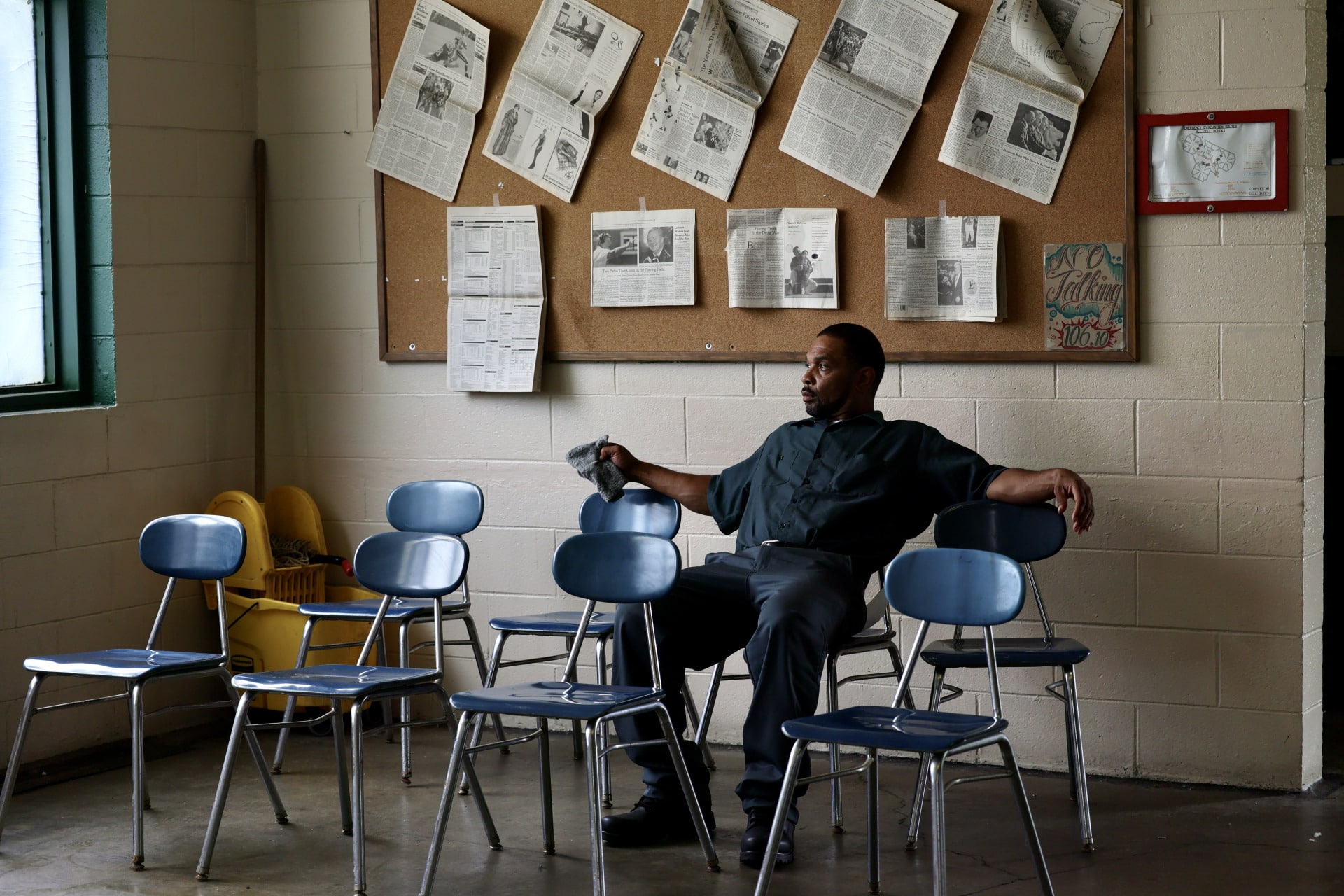
There are a handful of moments in Sing Sing—Greg Kwedar’s new feature about inmates in a maximum security prison seeking expression through the arts—in which first-time screen actor Clarence ‘Divine Eye’ Maclin transcends the mere concept of a singular “technique” in acting, while also tapping effortlessly into the craft’s most essential ingredients. It’s easily one of the best performances of the year.
It might help that, like many of the other cast members in Sing Sing, Maclin is playing a character based on himself, though that doesn’t make the feat any less extraordinary. He plays Divine Eye, the newest member of the Rehabilitation Through the Arts (RTA, which exists in real life and which Maclin was a member), a programme offering incarcerated men an opportunity to find community and re-discover themselves through creativity. Through a burgeoning friendship with Domingo’s Divine G, a longstanding member of the programme, Maclin’s character begins to reconcile with his most artistic self, reinventing his perception of masculinity and community in the process.
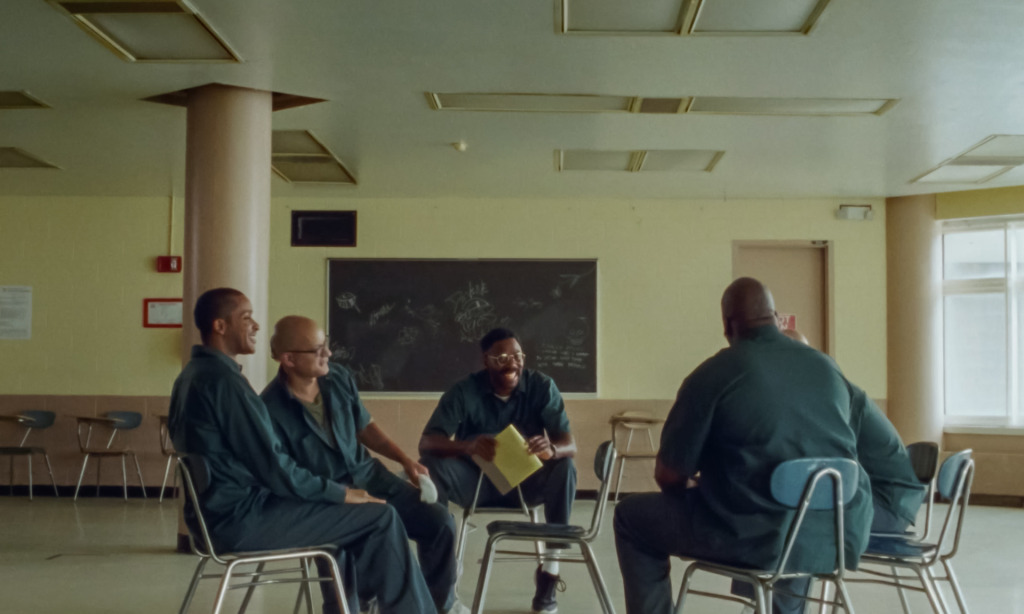
It’s something that many actors only ever aspire to: to commit to a performance so empathetically so as to transcend, or at the least create the illusion of transcending, the decision-making part of an actor’s brain, leaving in his stead pearls of pure, magnifying instinct. As a result, Maclin’s on-screen sparring matches with co-star Colman Domingo plays like a clash of two titans, with Domingo possessing a technical ability that is as astounding as any performer in our current cultural sphere, and Maclin a bottomless well of charisma. “The key…”, Maclin tells me with a charming, gap-toothed grin, “is to connect with your rawness.”
Luke Georgiades: Tell me about seeing this film with a fresh audience.
Clarence Maclin: The audiences have been resonating with it in all the same places. They laugh in the same places, they cry in the same places. The premiere in Toronto pretty much set the pace. At SXSW, I brought my mom. That was a blessing, to see her smiling and enjoying something that I created with my brothers.
LG: I know you also recently went back to Sing Sing penitentiary to screen the movie there. I wonder if, depending on those two audiences—the general audience and the audience at Sing Sing—whether you’re hoping for folks to take away different meanings from the film.
CM: It was filled with brothers. RTA alumni. Current participants in the programme. It felt like I was speaking to them through the screen. Like, brother, if I can do it? It’s attainable for everyone. You can go get it. But here’s the thing: you gotta start right here and now. I want them to know it’s not cool to keep suppressing your emotions. You have to express those. That’s what makes us whole human beings. Denying the empathetic part of yourself is doing yourself a disservice. We are the people. We need all the components of what it means to be humans, so I wanted to encourage the brothers inside to connect with those emotions.
The message to general audience members that aren’t incarcerated is that those who are incarcerated didn’t stop being human beings because they’re on the other side of this wall. They didn’t stop being human. The emotions that audiences feel watching the movie—they need to know that the people on the inside have those feelings too. The emotions that all humans have—they have too.
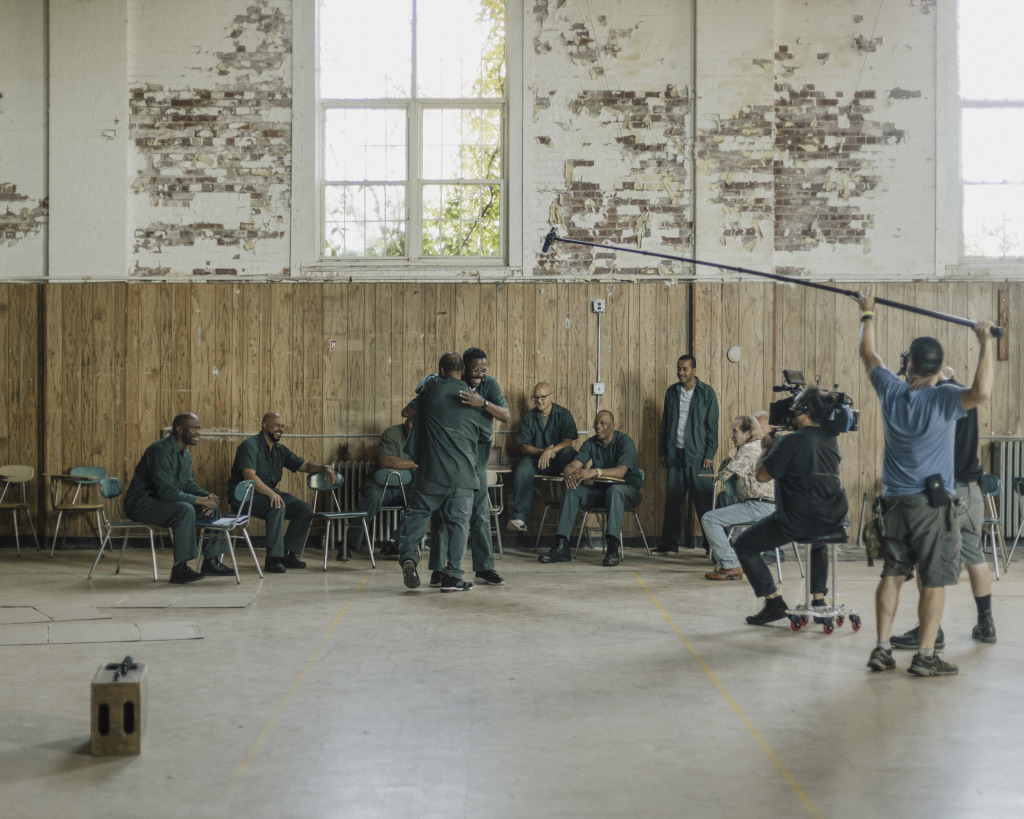
LG: What are some of the challenges of playing a version of yourself on screen as opposed to a completely fictional character?
CM: The challenge was creating that character in the first place. I took different aspects of experiences I’ve witnessed, behaviours I’ve encountered in other people, and my own personal experiences. All three of those elements are what this particular character was composed of. In RTA we were trained to do this. We had people from Broadway, from Theatrical backgrounds, come and train us to do this. That’s how I learned how to craft a character from something as simple as taking more notice of the environment around me and comprising what I’m absorbing into a version of myself.
LG: Tell me a bit about screen acting, because your experience prior to this has been such that there’s an audience a few metres away from you—now suddenly you have this camera up-close and personal. What was it like adapting to that part of this process?
CM: I had a lot of good advice from Mr. Domingo, and I had great directors who were interested in how I felt about bringing these emotions out onto the surface. In theatre, I thrived off my connection to the audience, who would be reacting to each decision and action instantaneously, constantly letting me know how I’m doing. You don’t get that from the camera. But they guided me in how to use that energy and translate it in a different way for the screen. On the stage it’s about pushing your voice as far as possible so the person in the back seat can catch every syllable and enunciation. But they taught me how to bring that tendency to a more intimate place that lives inside of the 8 inches of a camera frame. It pulls more out of you—you gotta dig deep down and bring it out, but you gotta bring it out softer than you would on the stage. It’s a craft.
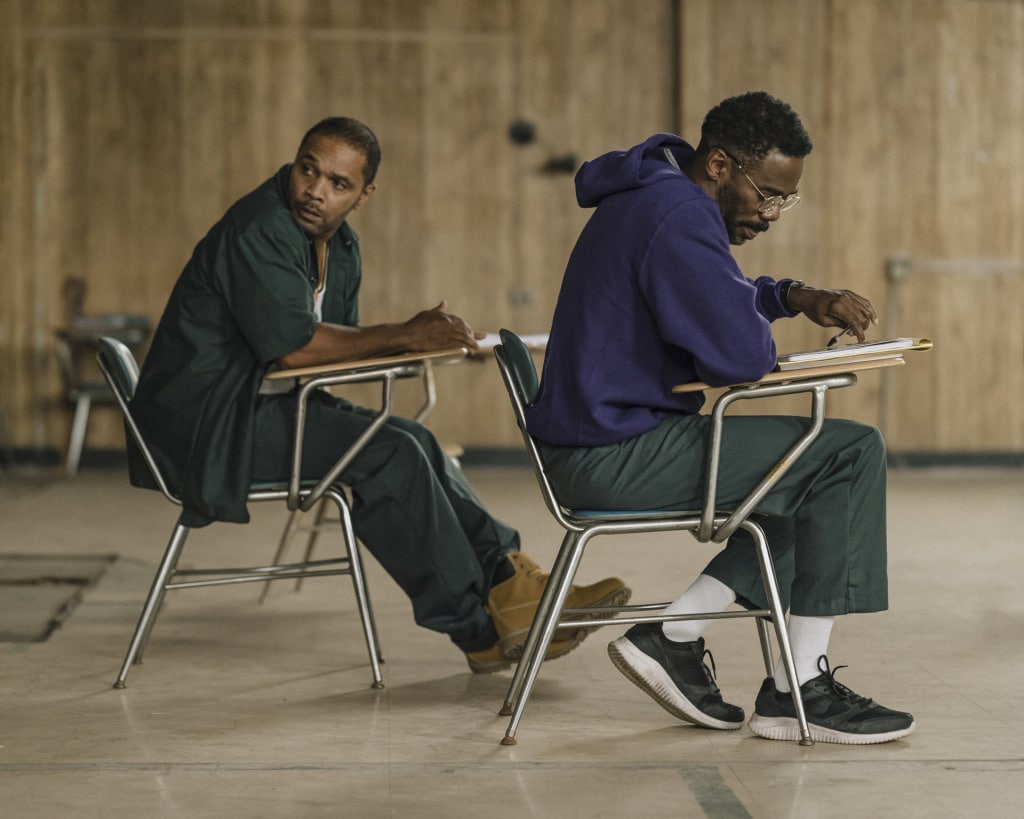
LG: Did it take some convincing to get you to take the part in the movie?
CM: After the first meeting, I was all in. After meeting Greg and Clint, chopping it up with them, getting to know them and how they saw the world. That happened before the script, we just knew they wanted to make a movie based on the play that we had done. The real story evolved from the real-life friendship between Divine G and I that we shared when we were on the inside.
LG: You were among the handful of people who first met director Greg Kwedar eight years ago, at Brent Buell’s house, where the first seeds of this movie were planted.
CM: It was an immediate click. We got to know each other by discussing how we see the world, by how we see other things, not necessarily the movie. What’s your take on the news right now? That’s how I knew these individuals were genuine and authentic. Authenticity is the core of what we wanted this to be. We wanted it to maintain the integrity of the individuals whose shoulders I stand on, who pulled me into the programme. I was charged with the integrity of the programme—above all, I wanted to keep that intact.
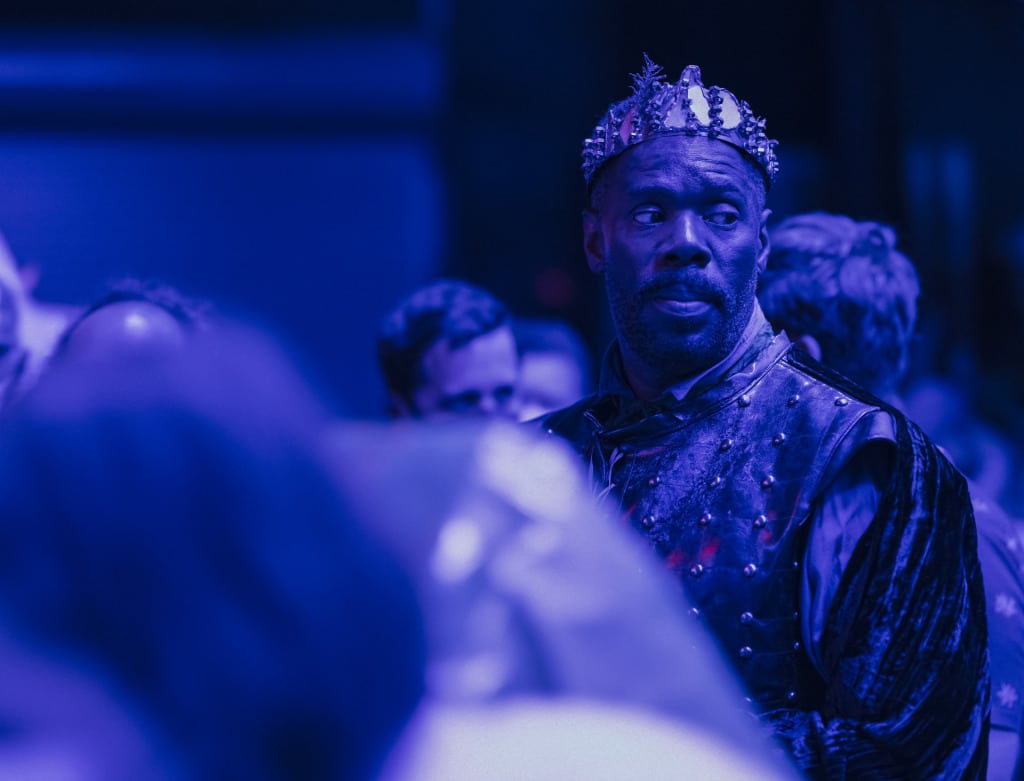
LG: Did Greg suggest any films for you to watch that he thought might help with the process of getting into that screen acting mode, or did he just trust that you were going to take to it really naturally?
CM: No one suggested any films for me to watch. Colman and I met through zoom, we rehearsed on zoom. There were times when I was in New York and he was in LA, and he’d be driving and pulling his car over to run lines with me. That showed a level of commitment to, not only this movie, but the integrity of the programme. At that point, I still hadn’t met him. I had only seen him on TV [laughs].
LG: That must have been cool when you finally got the chance to meet him and could start figuring out the physical element of your guy’s chemistry together. That spoke to me just as loudly as the dialogue itself.
CM: That was based on the friendship we had formed. The bond shines through both of those characters. He trusted me, and I trusted him.
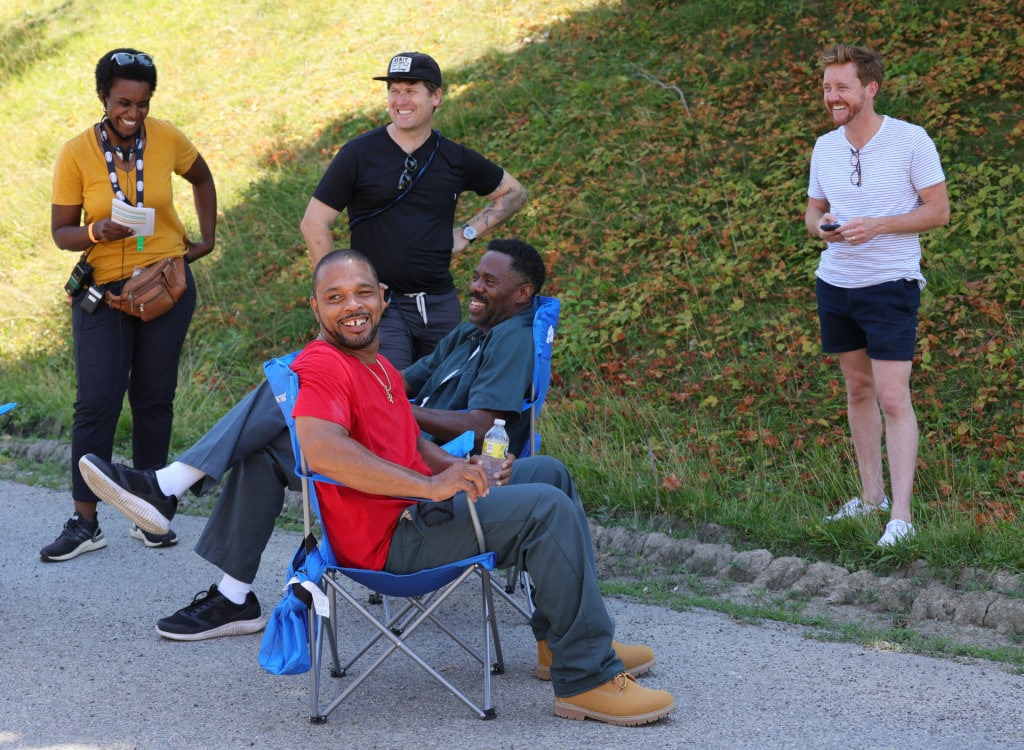
LG: So much of this movie is about the strength of community teaching and learning from each other. What would you say Colman taught, maybe about acting, during this process, and what would you like to think that you taught Colman about acting or your experiences etc.
CM: He taught me to trust myself more. To rely more on myself, that anything I create should have a touch of me, and to trust in that process. I believe that I taught him…well, it certainly wasn’t fashion. My boy is nice already [laughs]. Maybe I gave him a touch of arrogance. He taught me how to trust, and I taught him to embrace his own arrogance.
LG: There are a few moments early on in the film where your character is struggling with that idea of bringing his vulnerability out in front of his peers. What would you say is the key to that for other people who might want to take part in their local theatre programmes, or school productions, and might be facing those similar difficulties.
CM: The key is to connect with your rawness. Expose your rawness, and your vulnerability. That’s the real you. It will be therapeutic for you, and it will help you navigate your relationship with your own masculinity. Once I allowed others to witness my vulnerability, it imbued me with strength, because I started to become my truest self. A setting like prison is designed to make you want to put up a wall between yourself and others. They’re designed to make you disconnect from the most natural of human qualities, like empathy. So, once you recognise that it’s designed that way, that becomes your weapon against it. Now you don’t have to fall prey to it, because nothing’s stopping you from going up to someone and saying “good morning, brother, everything good?” There’s nothing that can physically stop you from doing it. It’s a super power we all have.
LG: When you were part of the real RTA programme, was there a single moment, a line reading, a performance or conversation, where it all clicked for you, and you felt that wave of spiritual and emotional validation from that experience of creating something on stage?
CM: It was gradual, but I can remember moments where I could feel the lock was being picked. It was a performance I saw my brothers do. When I saw my brother Deano Johnson play Big Chief in RTA’s adaptation of One Flew Over The Cuckoo’s Nest, I saw flashes of the real Deano in that character—he became a more realised version of himself by embodying someone else. That was a moment where I thought “this could happen to me too.”
LG: What was the first production you were a part of?
CM: It was called Stratford’s Decision, it was written by prisoners and it was an Elizabethean play. We had these elaborate costumes, and it was very colourful up on stage. I remember I was up on stage posturing [laughs]. And then the director said I was animated enough that I should have two lines. That was it. I was bitten. The next play, I knew I wanted to be the lead.
LG: I loved that the play that we see in the movie never needed to make sense. It spans multiple different time periods, multiple different characters from different stories, some pre-existing and some newly created. Because it’s not about the story, but keying into a certain emotion.
CM: Right. And the audience was able to follow along with every story beat of Breaking the Mummy’s Code. We did a lot of classical plays, we did Oedipus Rex and Hamlet, but at that time there was tension in the prison, and everyone needed levity. So that part of the story was true. After we did that play, they were talking about it for months.
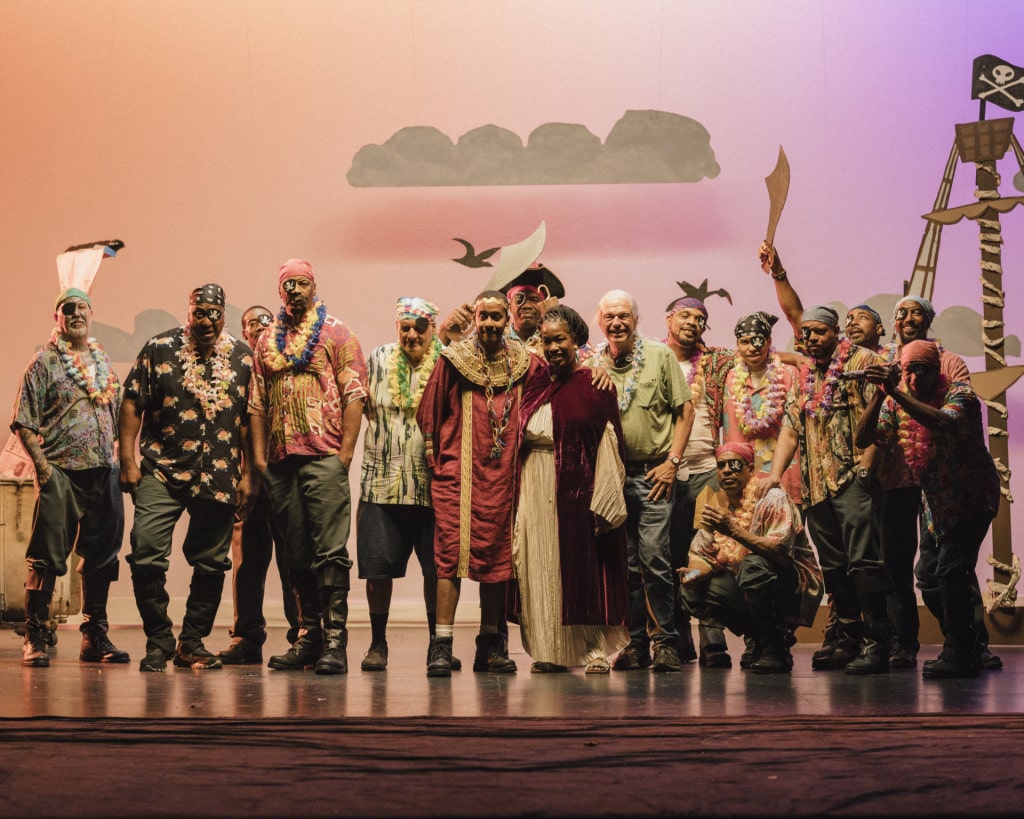
LG: When you originally stumbled upon RTA, it triggered that creative urge in you. Were you always aware of your own artistic capabilities?
CM: I used to like to draw a lot. I never played sports, even though my body type looked like that’s what I should have been doing. But I’d rather draw, paint, or be creative with my hands. However, being that that wasn’t what the cool kids were about, somewhere along the line I started to suppress that artistic talent in me. And it never rekindled until I got into the RTA programme. But once it did? It became a blaze. It wasn’t a small flame anymore, and now I was hungry to make up for all the time I had lost not creating. So I just wanted to tear the stage up, absorb everything, learn everything I could about this craft.
LG: This movie takes a few directions that I really wasn’t expecting as an audience member, and I think it’s because our brains are coded to see a “prison movie” in a certain way. Did you and the filmmakers discuss certain stereotypes of prison-set movies you really wanted to avoid, and that you felt didn’t have a place here.
CM: A lot of those prison movies are not true to form as far as what our experiences are inside prison. What you saw in the movie was our experience. There’s brotherhood, there’s camaraderie. We cared for one another. It’s not just a dog-eat-dog, everybody savage, everybody stabbing and raping each other. I didn’t experience that during my entire 17 years of prison. Those films depict us in a very violent, savage, unintelligent manner. But guess what? Everyone on stage with me got college degrees that we studied for in prison. That’s what we wanted to show. I’m not denying the brutality that exists inside, but there are individuals in prison who choose every day not to partake in that, who are seeking to better themselves and leave prison as better human beings than when they went in.

LG: I also liked that the filmmakers give Divine G some real dimensionality. He’s not this character who is all encompassing wisdom. Actually, he’s in just as much pain as everyone else, he’s got an ego that sometimes surfaces in negative ways. This movie acknowledges the spiritual journey that never ends.
CM: It came naturally like that. For one, Colman captured Divine G very well, he played him to the brim. If you caught a flash of Colman over there rocking the costumes and the mannerisms, you’d swear that was Divine G. But also, we wanted to keep it open-ended for that very reason. That’s what the driving off was about. You never see us stop the car. It’s still going. We’re still going.
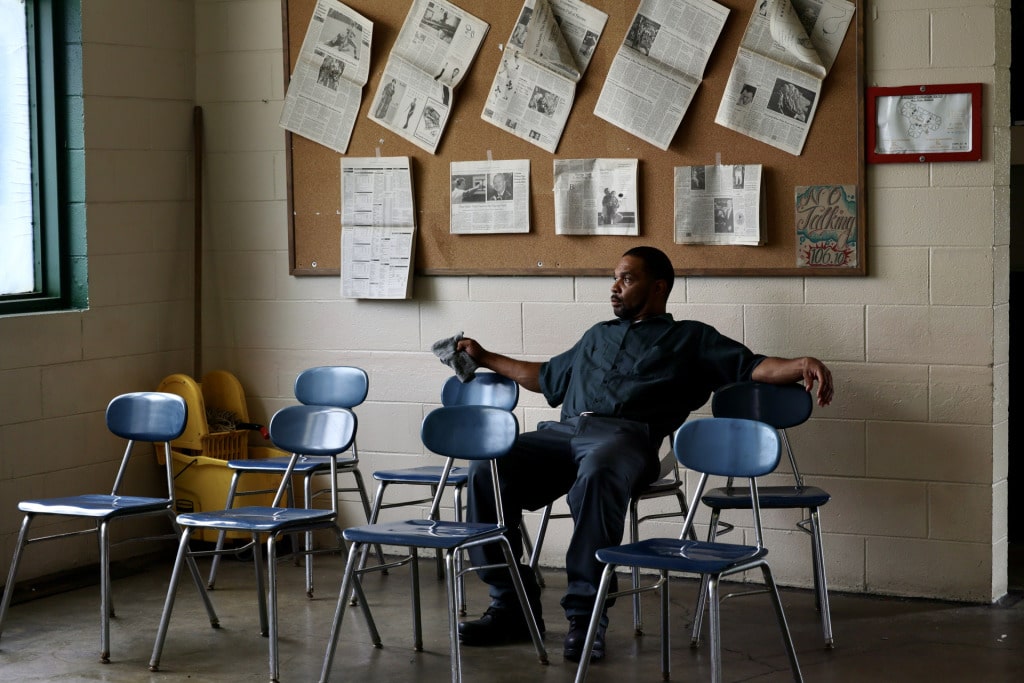
LG: You’re such a powerhouse in this movie man i truly tip my hat to you. Do you feel the itch to continue being on screen? I’d love to know what kind of character you would love to play next, that you’ve always wanted to play?
CM: I most certainly want to continue. I love this storytelling thing. I wanna be in a Western. I want to dress up, suit and tie. I wanna be a spy or something. I wanna do some Star Trek [laughs]. I just wanna keep telling stories.
LG: Did you write and direct when you were in the programme?
CM: I don’t believe I did, no. I was interested in every aspect of the process, though, I just never got the opportunity to do it. Because if you gave me a choice? I’m gonna hit the wood. I’m gonna be on stage.
LG: Before this interview I got sent the production notes, and they stressed the importance of using terms like “people convicted of a crime” instead of the more commonly used terms like convict. I wonder if you could speak more on that because it’s not something many people consider to do at first.
CM: To get a common language that wasn’t abrasive to the individual was the idea. To a prisoner it’s offensive to call them an inmate, or a convict. Some people may even consider prisoner a derogatory term. Going through that experience of being called something that feels derogatory to you can damage your ego, it can damage your psyche. We already have delicate psyches, especially someone who’s already done ten years. Keep that in mind. Even the brothers that look like they got it all together, and it looks like it doesn’t bother them—it really does.
Sing Sing is out now in UK cinemas.





